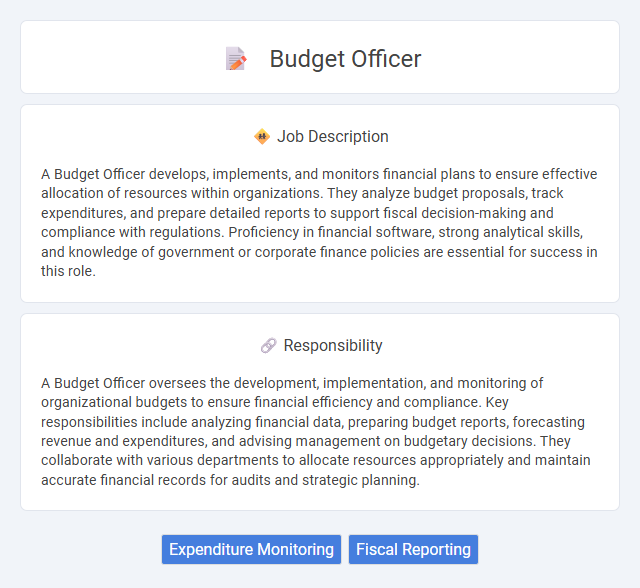
A Budget Officer develops, implements, and monitors financial plans to ensure effective allocation of resources within organizations. They analyze budget proposals, track expenditures, and prepare detailed reports to support fiscal decision-making and compliance with regulations. Proficiency in financial software, strong analytical skills, and knowledge of government or corporate finance policies are essential for success in this role.
Individuals with strong analytical skills and attention to detail are likely suitable for the role of a budget officer due to the job's requirement for accurate financial planning and management. Those who thrive in structured environments and are comfortable working with numbers and data tend to perform well in this position. People who struggle with organization or have difficulty interpreting financial information may find the demands of this job challenging.
Qualification
A Budget Officer must possess a strong educational background in finance, accounting, economics, or public administration, often requiring a bachelor's degree and preferred certifications such as Certified Government Financial Manager (CGFM) or Certified Public Accountant (CPA). Proven experience in budget analysis, financial planning, and fiscal management within government or corporate sectors is essential. Strong analytical skills, proficiency in financial software, and the ability to interpret complex financial data support effective budget preparation and monitoring.
Responsibility
A Budget Officer oversees the development, implementation, and monitoring of organizational budgets to ensure financial efficiency and compliance. Key responsibilities include analyzing financial data, preparing budget reports, forecasting revenue and expenditures, and advising management on budgetary decisions. They collaborate with various departments to allocate resources appropriately and maintain accurate financial records for audits and strategic planning.
Benefit
A Budget Officer likely enhances an organization's financial efficiency by carefully planning and monitoring expenditures to prevent overspending. They probably contribute to improved resource allocation, which can lead to cost savings and increased profitability. Their expertise may also support strategic decision-making through accurate financial forecasting and analysis.
Challenge
Budget officers likely face the challenge of balancing multiple financial priorities while ensuring accuracy and compliance with regulations. They must probably navigate complex data and forecast financial trends under tight deadlines. Managing competing demands from various departments can also pose significant difficulties in achieving organizational goals.
Career Advancement
A budget officer plays a crucial role in managing an organization's financial planning and resource allocation, which provides a strong foundation for career advancement into senior financial management roles. Expertise in budget analysis, forecasting, and financial reporting enhances opportunities to progress to positions such as financial controller or chief financial officer. Continuous professional development and certifications like Certified Government Financial Manager (CGFM) or Certified Public Accountant (CPA) significantly boost prospects for promotion within the finance sector.
Key Terms
Expenditure Monitoring
Budget officers specializing in expenditure monitoring track organizational spending to ensure alignment with allocated budgets and financial policies. They analyze financial reports, identify discrepancies, and implement corrective measures to prevent overspending and optimize resource allocation. Proficiency in financial software and regulatory compliance standards is essential for maintaining accurate and effective expenditure control.
Fiscal Reporting
A Budget Officer specializing in Fiscal Reporting manages the preparation and analysis of financial statements to ensure accurate tracking of expenditures and revenues. They utilize advanced budgeting software and accounting principles to compile comprehensive fiscal reports that guide organizational decision-making and compliance with regulatory standards. Proficiency in financial forecasting, variance analysis, and government accounting procedures is essential for maintaining transparency and fiscal responsibility.
 kuljobs.com
kuljobs.com